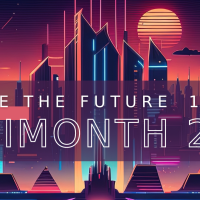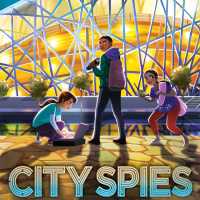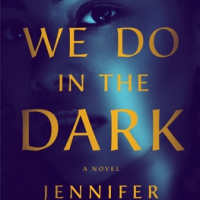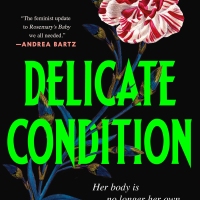Book Review: The Shadowed Sun by N.K. Jemisin
 The Shadowed Sun by N.K. Jemisin
The Shadowed Sun by N.K. Jemisin
Genre: Fantasy
Series: Dreamblood #2
Publisher: Orbit (2012)
Author Info: www.nkjemisin.com
Wendy’s Rating: 3 of 5 stars
I was hard on the first book in this series, The Killing Moon, mainly because I had read Jemisin’s The Hundred Thousand Kingdoms first and fallen in absolute complete and total love with it. The Dreamblood series lacks the depth of characters and relationships that sucked me into The Inheritance Trilogy.
The Killing Moon also troubled me because it spent so much time identifying people by the colour of their skin and insulting the lighter shades. As much as I wanted to read a book that moved far away from the typical pale science fiction and fantasy colour scheme, I did not enjoy constantly reading about how inferior my own skin was.
There is less of the latter in The Shadowed Sun. Instead, the prejudice is against women. There are three major cultures in question. One, the Kisuati, are the people who now rule the city of Gujaareh, after the mad king’s attempts at immortality in the previous book. The Kisuati women hold equal power to men and are respected, as evidenced by Sunandi’s governing position over Gujaareh. Her influence has helped install the first female Sharer within the Hetawa–but more on that later. While the Kisuati generally treat their women respectfully, whores are still whores, and even the religious Sisters lives are considered forfeit. Even when they are sexually assaulted.
Sexual assault, abuse of women, and rape are constant plot devices in the book, which is ironic since the other two cultures revere women as goddesses. In the “barbarian” Banbarra tribes, women are worth as much as they can show themselves to be worth, but only then are they respected. Rape is frowned upon, and punished, but it is also punishment for women outside the tribe. And in Gujaareh itself, women are revered, but not permitted to do much beyond look good, and their opinions are not particularly valued,.
Which makes life difficult for the young Hanani, who is the first female permitted to serve the goddess Hanaja at the Hetawa, the religious centre of Gujaareh. The problems I mention above did deter me to the point of considering not reading beyond the half way point, but I do like Jemisin’s writing, and I most certainly love the world she has created, in spite of the racism and sexism. Let’s start with the Hetawa and the magic they possess: narcomancy. Unique and well-crafted magic is always a highlight in a good fantasy book, and that certainly is the case here. Through sleep and dreams, the priests of the Hetawa can do many things, from healing, to lie detection, to granting peaceful journeys into the afterlife. They can also kill with deadly efficiency. We learned about the Gatherers previously, and now we learn about the Sharers, who use their powers to heal–but could hurt just as easily, if they make that choice. With such power, corruption is not surprisingly common, as we discovered in The Killing Moon. While the Hetawa’s corruption is no longer in question here, we learn about the many other ways those with the dreaming gift can cause harm. In this case, a Wild Dreamer is causing a plague that captures people within tormented nightmares, instantly killing even the most skilled dreamer who attempts to fight it.
Meanwhile, the repercussions of the Kisuati invasion ten years earlier are still echoing through Gujaareh, with rumours of the return of its exiled prince.
The Killing Moon fell a bit short with the political machinations, and all but fizzled out on a promised war, but here, Jemisin goes deeper and gets far more intricate with the details and various parties involved, giving us insight into all of them. I particularly like the intricacies of the different cultures and how they communicate with each other and with the other groups. This is most evident in the exiled prince, Wanahomen, who maintains his Gujaareen ways, but must adhere to the ways of the Banbara whom he will lead to war against the Kisuati to free his people, if he can band the tribes together.
There is a lot more emotional involvement with the characters here, something that was somewhat missing in The Killing Moon due to the subdued nature of the Gatherers. While Hanani shares this demeanour, she is unable to maintain it when she is forced to join the barbarians in the desert. The relationship that develops between Hanani and Wanahomen is bittersweet, and is what managed to get me over my consideration of not reading further. I’m glad I did, because I did like where things ended up, even if I didn’t enjoy some of the methods used to get there.













It seems like this one is a tough read on many levels. But sometimes all it takes is character and their relationship to reel you in and bring you to the last page.
LikeLike
I’m glad I kept at it. It’s still not as good, IMO, as the Inheritance Trilogy, and has a lot of problems that I simply did not enjoy dealing with, but there’s a lot of good in there too.
LikeLiked by 1 person
I never got through book 1 But I did like her other series…to a point
But I did like her other series…to a point
LikeLike
Ah yes I’m not sure about this one… I think the points would bother me with everything. It’s a difficult topic to use but at last some things were good too. But I think I’ll pass.
LikeLike
It’s one thing to step away from the typical white skinned characters that are typical to this genre, but it’s a quite another to do so via insults. Rape is a no-fly zone for me; I just can’t read about it, so I won’t be giving this book a second glance. Bleh.
LikeLike
It really surprised me to see so much of this in these books, especially considering the quotes I’d read from her, which were half my inspiration for reading The Hundred Thousand Kingdoms. I’m glad the latter did not include the sexism and racism, at least certainly not to this extent. Otherwise, I would have been hard pressed to read any of her other books.
LikeLike
I was a bit disappointing with this one despite LOVING the first in the series. I was opposite of you, only kinda liking the start of her trilogy but considering The Killing Moon one of my favorite reads of last year. Enjoyed the second half, but it didn’t wow me like the first one did.
LikeLike
There was a lot to like, but the things I didn’t like were far too jarring.
I really did like the magic though. Narcomancy and the way she balances such power is really intriguing.
LikeLike
OK, I didn’t read this one very close because I haven’t read the first book in the series, but as someone who has yet to read anything by N. K. Jesmin, would you recommend Hunderd Thousand Kingdoms over this series? It kind of looked that way from skimming 🙂
LikeLike
I cannot stop singing the praises of Hundred Thousand Kingdoms. I highly recommend it. This one has good things and Nathan really liked it, but I have issues with it. The Inheritance Trilogy though? Oh my feels…
LikeLike
I had the opposite reaction to you, I think – wasn’t a huge fan of the Hundred Thousand Kingdoms but LOVED both this book and The Killing Moon. I do want to reread her other books though, see if I like them better the 2nd time through.
And I don’t think you have to read the whole darker/lighter skin thing as an insult – historically some cultures have judged themselves that way, and there’s enough white=goodness&light fantasy out there to counterbalance it. But that’s just my opinion! 🙂
LikeLike
I know that many cultures judge by skin tone, considering it’s a reality that I have grown up with. Having dealt with it constantly from the European-based fantasy where I could at least roll my eyes at the general ignorance of it all is one thing. Here this was very specific and completely unnecessary, as she shows in her other books where skin colour is commented on, but not made a huge issue out of. Then to add the sexism and rape on top of it? I’m usually pretty open minded and will tolerate a lot, but this was overboard and unnecessary in the repetition of these particular issues.
LikeLike
Pingback: Tough Traveling: Desert Nomads | The BiblioSanctum
Pingback: Tough Traveling: Novices | The BiblioSanctum
Pingback: Tough Traveling: Awesome Displays of Power | The BiblioSanctum
Pingback: Tough Traveling: Magic Systems | The BiblioSanctum